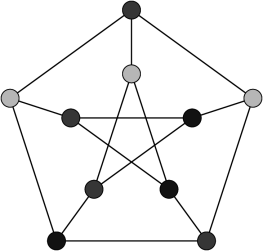Rational numbers in decimal
In decimal representation, rational numbers either terminate after a finite number of digits or produce a repeating sequence. Conversely, any repeating decimal can be converted into a rational number e.g. (10∗0.333..−0.333…)/9=1/3.
How can one generate this representation in code with the repeating digits, if any, parenthesized? Find values 0<=n<b, the period of repeating decimal, and 0 <= m < b, the length of the period’s prefix, such that (10n−1)∗10m/b is an integer. E.g. 1/3=0.(3) has n=1 and m=0 while 89/26=3.4(230769) has n=6 and m=1.
Here’s code that avoids using floating-point division and shortest repeating substring to find the decimal representation. Note that the method used to find n and m have linear complexity but can be implemented using binary search. See note at the end for another way to find m, the length of the prefix.
private static String printRational(long num, long den) {
StringBuilder sb = new StringBuilder();
// early return for finite-length strings
if (!isRepeating(sb, num, den)) {
return sb.toString();
}
// find the period of the repeating part
int period = 1;
long rem = 0;
long numMult = 0;
for (long mult = 10; period < den; ++period, mult *= 10) {
numMult = (mult - 1) * num;
long quot = numMult / den;
rem = numMult - quot * den;
if (rem == 0 || !isRepeating(null, numMult, den)) {
break;
}
}
// return if the decimal has no prefix
if (rem == 0) {
return sliceString(sb, 0, period);
}
// otherwise, find the length of the prefix
int prefix = 0;
rem = 1;
for (; (prefix < den) && (rem != 0); ++prefix) {
numMult = numMult * 10;
rem = numMult - (numMult / den) * den;
}
return sliceString(sb, prefix, period);
}
// long division - return true iff given number is repeating
private static boolean isRepeating(StringBuilder sb, long num, long den) {
long quot = num / den;
long rem = num - quot * den;
if (sb != null) {
sb.append(quot);
}
if (rem == 0) {
return false;
}
if (sb != null) {
sb.append('.');
}
for (long idx = 1; (idx < den) && (rem != 0); ++idx) {
rem = rem * 10;
quot = rem / den;
rem = rem - quot * den;
if (sb != null) {
sb.append(quot);
}
}
return rem != 0;
}
private static String sliceString(StringBuilder sb, int prefixLength, int period) {
int idx = sb.indexOf(".") + prefixLength + 1;
return sb.substring(0, idx) + "(" + sb.substring(idx, idx + period) + ")";
}
All rational numbers with prime denominators and even length periods have the ‘nines property’ i.e. the first and second half-periods of the repeating part add up to 9…9 (Proven in W. G. Leavitt, A Theorem on Repeating Decimals, 1967 paper. Also, an interesting lemma on the length of the prepend to the period (it is the number of times the denominator is divisible by either 2 or 5).


